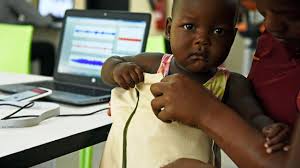Pneumonia is an infection that inflames the air sacs in one or both lungs. Symptoms include a cough with phlegm or pus, fever, chills and difficulty breathing. The infection can be life threatening to infants, children and people over 65. A variety of organisms, including bacteria, viruses and fungi, can cause pneumonia. Antibiotics can treat many forms of pneumonia, some forms of which can be prevented by vaccines.
Desk officer on Pneumonia at the Family Health Department, FMoH, Abuja, Dr. Oluseyi A. Omokore, in a chat with The Guardian, yesterday, said Pneumonia predominantly affects children under five and kills them more because of low immunity.
According to him, the incidence is high in Nigeria due to increasing urbanisation and greenhouse emission. “The incidence of malaria in children under-five is also higher than that of pneumonia but there are more deaths due to pneumonia. Why? Everybody can treat malaria but the situation is not the same with pneumonia. It affects the lungs and most people do not know about it. It is the highest killer of children under five in Nigeria and constitutes 16 per cent of total number of under-five mortality.
“The immunisation coverage is low. Despite the fact that there are pentavalent vaccines and pneumococcal vaccines available for protection, they are not readily available especially in hard-to-reach areas. The response to the treatment of cases in these areas is also very slow and low. The children die in the hard-to-reach communities because the facilities for diagnosis and treatment are not there. Insecurity in most parts of the country is also a major constraint to immunisation. Most of the deaths are caused in hard-to-reach areas.”
Omokore, however, said the Federal Government is addressing the situation through Integrated Management of Childhood Illnesses (IMCI). IMCI is an integrated approach to child health that focuses on the wellbeing of the whole child. “IMCI aims to reduce death, illness and disability, and to promote improved growth and development among children under five years of age,” he said.
Meanwhile, new analysis from UNICEF, Clinton Health Access Initiative (CHAI), Save the Children and Murdoch Children’s Research Institute (MCRI) has revealed that severe pneumonia leaves an estimated 4.2 million children under the age of five in Nigeria and 123 other low- and middle-income countries with critically low oxygen levels each year.
Severe pneumonia affects more than 22 million young children in low- and middle-income countries each year and kills more than malaria, measles and diarrhoea combined.
According to the report, medical oxygen could save the lives of many children with severe pneumonia, coupled with antibiotics. But in many places, oxygen to treat a child with severe pneumonia over three-four days can cost at least £30-45. For the poorest families, that bill represents a huge barrier to treatment – if the child is able to get to a health facility with functioning oxygen and trained health workers at all, which are often scarce in poorer countries.
Poorer countries faced a huge lack of oxygen systems and supplies even before the onset of COVID-19. But surging needs due to the pandemic have given these shortages prominence. The good news is, oxygen can be produced locally at affordable cost.
Following the onset of the pandemic, worsening shortages and rising prices of oxygen have been reported in countries with some of highest numbers of child pneumonia deaths, such as India, Bangladesh and Nigeria. According to the World Health Organisation, the poorest countries may currently have just five to 20 per cent of the medical oxygen they need, overall.
In a commentary published in the Lancet on World Pneumonia Day, 12 November, global health agencies including Save the Children and UNICEF call for governments and donors to build on the investment and efforts made to respond to COVID-19 to strengthen health systems that can tackle childhood pneumonia.
Meanwhile, according to a press statement released yesterday by Stop Pneumonia Initiative, pneumonia is the single biggest infectious killer of adults and children – claiming the lives of 2.5 million, including 672,000 children, in 2019.
It noted: “This year World Pneumonia Day – on November 12, 2020 – will be held during a global pandemic that is dramatically increasing pneumonia deaths from COVID-19 and other causes.
“COVID-19 could add 1.9 million to the death toll this year. This could increase ‘all-cause’ pneumonia deaths by more than 75 per cent. No other infection causes this burden of death.
“Disruptions to healthcare services are estimated to cause up to an additional 2.3 million child deaths – 35 per cent from pneumonia and newborn sepsis.
“Many countries across Africa, Asia and Latin America, struggling with heavy burdens of COVID-19 and child pneumonia deaths, will need effective strategies to fight both. Investments in infection prevention (masks, social distancing, hand washing etc.), and improved diagnosis and treatment (with pulse oximetry and oxygen) can save lives during the pandemic – and beyond.

 This year’s World Pneumonia Day (WPD) is being celebrated today, November 12, 2020, with some gloomy figures from the Federal Ministry of Health (FMoH), which indicate that the disease kills between 142,000 and 160,000 under-five children in Nigeria every year.
This year’s World Pneumonia Day (WPD) is being celebrated today, November 12, 2020, with some gloomy figures from the Federal Ministry of Health (FMoH), which indicate that the disease kills between 142,000 and 160,000 under-five children in Nigeria every year.




